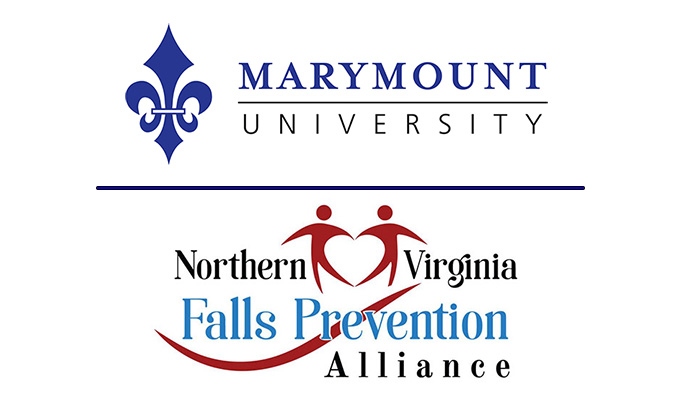As the leading cause of fatal and non-fatal injuries in adults over the age of 65, falls can greatly impact the health and well-being of older adults in our community. In 2018, there were an estimated 36 million falls resulting in eight million injuries. That translates to more than 950,000 hospitalizations and $50 billion in annual health care costs. Falls also contribute to traumatic brain injuries, hip fractures and can lead to decreased independence and quality of life.
In response to this critical health issue, Marymount University and local senior-serving organizations continue to draw on two federal grants, totaling over $1 million, to help reduce the number of falls among older adults in Northern Virginia. Thanks to an initial grant from the U.S. Dept. of Health and Human Services, Administration for Community Living, and a second grant in 2018, Marymount has laid the foundation for a falls prevention infrastructure across Northern Virginia.
“Falls among older adults are unfortunately all too common, but we aim to share the message that they don’t have to be an inevitable part of aging,” said Dr. Rita Wong, Associate Vice President for Research at Marymount and principal investigator of the grant team. “By performing the right exercises, making their homes safer and getting regular health check-ups, older adults can significantly reduce their chances of falling and injury.”
Joining Dr. Wong as investigators are Dr. Sara Pappa (Assistant Professor of Health and Human Performance and Coordinator of the Northern Virginia Falls Prevention Alliance, or NVFPA), Dr. Uma Kelekar (Associate Professor of Health Care Management) and four faculty members from the Physical Therapy program – Dr. Diana Venskus, Dr. Cathy Elrod, Dr. Julie Ries and Dr. Jade Bender-Burnett.
During September and October, including National Falls Prevention Awareness Week which lasts from September 20-24, Marymount and its community partners are hosting several virtual falls prevention events (click here for more details).
As a result of grant funding, more than 475 people have been trained to be lay leaders of evidence-based falls prevention programs, 192 falls prevention workshops have been held across the region and the NVFPA was established, which has more than 120 members.
To date, these programs have reached 4,738 older adults. During the second round of funding, Marymount faculty are working to:
- Expand the activities of Marymount’s regional training office that prepares lay leaders/coaches to run evidence-based falls prevention programs.
- Provide support to community organizations in establishing falls prevention programs.
- Foster the full maturity of the NVFPA.
- Build a robust referral network for falls prevention programs.
- Establish academic-community partnerships for falls prevention and optimal aging promotion.
The grant has helped older adult community groups in Northern Virginia establish three evidence-based falls prevention programs – Stay Active and Independent for Life (SAIL), a strength, balance and fitness program for older adults who are at low-to-moderate risk for falling; Matter of Balance, which features small group sessions led by a trained facilitator designed to reduce the fear of falling and familiarize older adults with balanced-focused exercise activities; and Otago Exercise Program, a series of strength and balance exercises targeting older adults at high risk for falling, implemented under the guidance of a physical therapist.
In an effort to maintain a presence in the community during COVID-19, Dr. Pappa and other partners have been offering virtual SAIL programs over Zoom. This has allowed older adults in the community to continue to improve their fitness levels and decrease their risk of falling.
“Before COVID-19, many older adults and those delivering falls prevention workshops didn’t think the programs could be successfully delivered remotely. But the pandemic has taught us, and many older adults, about the benefits of having these programs available in a variety of formats,” Dr. Pappa explained. “Going forward, many falls prevention programs will remain available through both face-to-face and remote delivery, further expanding access to those who need it.”
For more information on falls, prevention programs or how to get involved, visit the NVFPA website.





